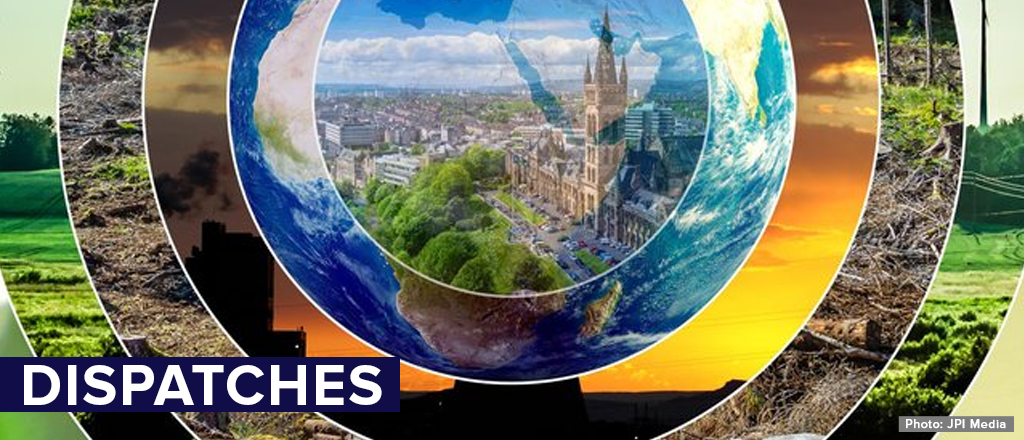

Dr. Naeem Shahzad, Head of Department, Department of Water Resources Engineering & Disaster Management, Military College of Engineering (MCE), National University of Sciences and Technology (NUST), Pakistan
08.11.2021
With the 26th UN Climate Change Conference of the Parties (COP26) on the cards and perceptible climate change impacts due to recent flooding events in Europe and the heat waves in Canada claiming hundreds of lives and huge economic loses, world leaders gather in UK more apprised of the threats of climate change. In this backdrop it is imperative to accelerate actions towards achievement of goals set forth in the UN Framework Convention on Climate Change and the Paris Agreement. It is estimated that the Earth’s climate has exceeded the bounds of natural variability and is likely to be further exacerbated owing to human interventions if the existing practices are continued as business as usual leading to temperature rise of around 4ºC by the end of 21st century (Representative Concentration Pathways RCP 8.5) according to IPCC fifth Assessment Report (AR5). The rate of climate change as a result of human activities is projected to be much faster than most of the recognized natural processes and certainly over the processes occurring over the past 10,000 yrs. Thresholds and tipping points likely exist that, if crossed, could abruptly and perhaps almost irreversibly switch the climate to a different regime.
Although the expected warming levels, whether they’re 2 degrees or more, aren’t mystical thresholds, factually every degree of global warming makes the planet worse, but they aren’t, however, unavoidable. As long as we act now, it is not too late to reduce the pace of climate change. Pakistan being amongst top ten most vulnerable countries to climate change impacts, nonetheless, sarcastically contributing to less than 1% GHG global emissions has started taking proactive measures towards climate conscious efforts by the country. Recently submitted first Nationally Determined Contributions (NDCs) is a positive step in this direction. It highlights Government of the Pakistan’s progress in climate action including policies and programmes on Nature-based Solutions (NbS) as well as technology-based interventions. Pakistan has created significant natural capital restoration projects, such as the Ten Billion Tree Tsunami Programme (TBTTP), Protected Areas Initiative (PAI), and others, in recognition of the role of nature in climate adaptation and mitigation. These programmes have also helped the most vulnerable, such as women and youth, to improve their livelihood options. Besides, Pakistan has also implemented a number of policies aimed at reducing greenhouse gas emissions from high-emission sectors such as electricity and manufacturing, to name a few.
According to the regional fact sheet for Asia, 6th IPCC assessment report, a continued increase is expected in marine heatwaves, average and heavy precipitation, glacier runoff in the Asian high mountains and relative sea level around Asia, in some cases, faster than global average. Whilst seasonal snow duration, glacial mass, and permafrost area will decline further by the mid-21st century as the glaciers are declining and permafrost is thawing. This entails serious adaptation and mitigation measures in order to mitigate mounting climate change impacts in the region including Pakistan. As we move ahead in this century, the world is experiencing hydrometeorological disasters at an enhanced frequency and intensity, with no exception to Pakistan due to country’s climate change and climate-induced catastrophic events vulnerability, as well as consistently being amongst top ten according to Germanwatch’s Global Climate Risk Index, along with Haiti and the Philippines.
Despite approving a National Climate Change Policy (NCCP) in 2012, we have to think ahead of policies and plans focusing more towards their implementation in true letter and spirit holistically across all sectors on an expedited scale. We have a dedicated Ministry of Climate Change mandated to mainstream climate change in the economically and socially vulnerable sectors of the economy and to steer Pakistan towards climate resilient development. Concurrently, the country passed Climate Change Act 2017 to look after all issues related to climate change but its enactment still seems far from reality. Establishment of Climate Change Authority in presence of functional National Disaster Management Authority (NDMA) seems to be overlapping of authoritative functions especially when world is focusing on the synergies between Disaster Risk Reduction and Climate Change Adaptation. Similarly, creation of Pakistan Climate Change Fund, alongside National Disaster Risk Management fund appears to lack clarity in this context as a whole and is difficult to maintain and afford exclusively owing to the economic conditions of the country.
One of the objective of the NCCP is integration of the policy with other inter-related national policies. But approval of National Disaster Risk Reduction Policy a year later in 2013, National Water Policy in 2018 and National Food Security Policy in 2020 shows glaring gaps towards achievement of this objective. In countries like Pakistan subjected to economic and resource constraints, integrating and synergizing all such policies and their related organizations can help develop a cohesive, holistic and all inclusive approach towards tackling these issue. It is also in line with some of the basic principles of Climate Change Adaptation and Disaster risk Reduction highlighting clear delineation of roles and responsibilities during all phases of climate induced disasters and other emergencies. Some of the major challenges hampering this process are the overlapping of authorities and functions, low funding allocations, lack of capacity and qualified experts, governments’ priorities and will, besides financial imitations of developing countries.
COP 26 will surely conclude with enhanced commitments by the world leaders towards climate change adaptation and mitigation. But, the major responsibility lies with the governments of the countries subjected to increased climate change impacts with every passing day to work towards a climate resilient society making their own countries safe and secure from climate induced disasters. This is only possible if we start working on war footing as the clock is ticking to take mitigative and adaptive measures in order to be well prepared to embrace a future vulnerable to climate induced disasters along with its secondary and tertiary ramifications especially on the countries which cannot afford spending on the basic wellbeing of its population rather than spending on climate change adaptation and mitigation. It is also the responsibility of the developed nations to support low income and less developed countries to help them break the vicious cycle of poverty and financial constraints in order to adapt the vision of “Leave no one behind” as envisaged in the SDGs as well.
Disclaimer: The views expressed in the article are of the author and do not necessarily represent the institute’s policy.

